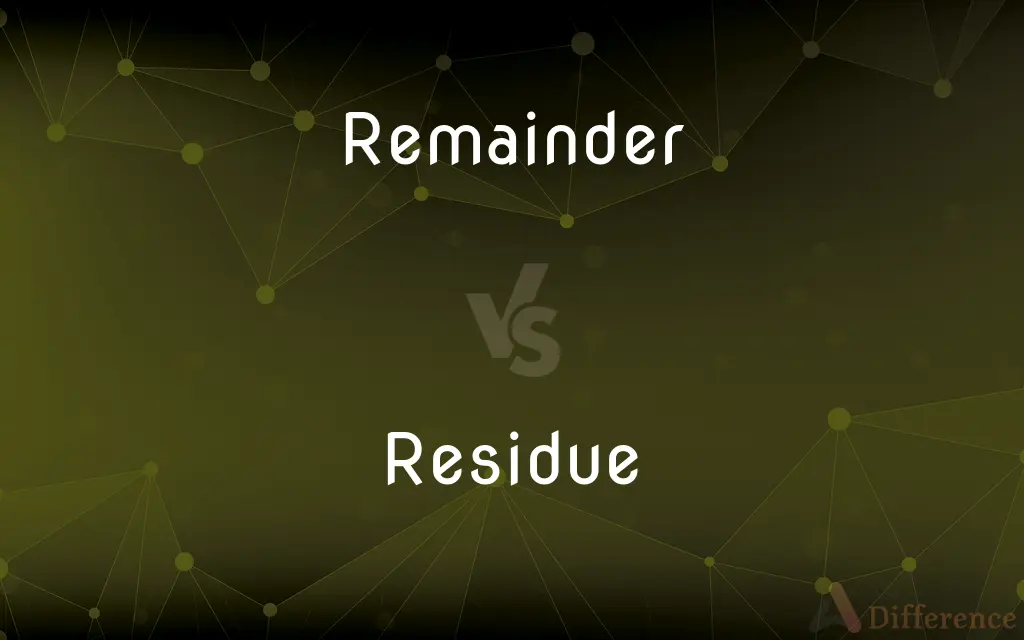Remainder vs. Residue — What's the Difference?
By Fiza Rafique & Maham Liaqat — Updated on March 26, 2024
Remainder denotes what is left after a part has been used or removed, whereas residue refers to a small amount left after the main part is gone, often implying a substance or remainder with specific characteristics.

Difference Between Remainder and Residue
Table of Contents
ADVERTISEMENT
Key Differences
The remainder is a term frequently used in mathematics to describe what is left after division, as well as in everyday language to indicate what remains after a portion has been taken away or used up. For example, after dividing 10 by 3, the remainder is 1. On the other hand, residue often refers to a substance or remnant left behind after a process, like the residue left in a container after a liquid evaporates, emphasizing its material or physical nature.
In mathematics, the concept of a remainder is strictly defined and is an integral part of division operations, providing a clear, quantifiable measure of what does not evenly divide. Residue, while it can be quantifiable in certain contexts, is more often qualitative, referring to the physical or chemical characteristics of what is left behind.
When talking about financial or legal matters, "remainder" can refer to what is left of an estate after debts and legacies have been distributed, or the remaining part of a sum after deductions. Residue, in these contexts, might refer to the leftover substances or materials from manufacturing processes, highlighting its broader and less precise usage compared to "remainder."
The term "remainder" carries a sense of completion or finality — what is left after an action is fully executed, such as the end balance of an account. Conversely, "residue" implies something left over that may need to be cleaned up or dealt with, suggesting a potential need for further action, such as the cleaning of chemical residue.
In literature and philosophy, "remainder" might be used metaphorically to describe what remains of a concept, culture, or philosophy after it has been critically analyzed or deconstructed. "Residue," however, could be used to describe the lasting impact or influence of an idea, emphasizing its lingering presence rather than its completeness or finality.
ADVERTISEMENT
Comparison Chart
Definition
What is left after division or subtraction
Small amount left after most is removed
Context
Mathematics, finance, general use
Chemistry, physical processes
Implication
Quantitative, exact
Qualitative, often physical or chemical
Usage
More precise, defined usage
Broader, more varied contexts
Connotation
Finality, completeness
Lingering, needing further action
Compare with Definitions
Remainder
Leftover portion after division.
Dividing 7 by 2 gives a remainder of 1.
Residue
Substance left after a reaction.
The experiment left a colorful residue in the beaker.
Remainder
What's left after deductions.
The remainder of his salary after taxes was substantial.
Residue
Lasting effect or influence.
His words left a residue of doubt in her mind.
Remainder
Remaining concepts or elements after analysis.
The philosophical discussion left us with more questions as remainders.
Residue
Substance or property remaining after processing.
The residue of the estate was divided among the heirs.
Remainder
Remaining part of an estate.
She received the remainder of the inheritance.
Residue
Remnant left behind physically.
Cleaning the oven requires removing greasy residue.
Remainder
What remains unused or unexploited.
A small remainder of the day was spent in reflection.
Residue
Leftover amount, usually small or insignificant.
Only a small residue of the budget was unallocated.
Remainder
In mathematics, the remainder is the amount "left over" after performing some computation. In arithmetic, the remainder is the integer "left over" after dividing one integer by another to produce an integer quotient (integer division).
Residue
The remainder of something after removal of parts or a part.
Remainder
A part of something that is left over when other parts have been completed, used, or dealt with
The remainder of the year
Leave a few mushrooms for garnish and slice the remainder
Residue
Matter remaining after completion of an abstractive chemical or physical process, such as evaporation, combustion, distillation, or filtration; residuum.
Remainder
A property interest that becomes effective in possession only when a prior interest (created at the same time) ends.
Residue
The part of a monomer or other chemical unit that has been incorporated into a polymer or large molecule.
Remainder
Dispose of (a book left unsold) at a reduced price
Titles are being remaindered increasingly quickly to save on overheads
Residue
(Law) The remainder of a testator's estate after all specific bequests and applicable debts and expenses have been disposed of. Also called residuum.
Remainder
Something left over after other parts have been taken away.
Residue
Whatever remains after something else has been removed.
Remainder
The number left over when one integer is divided by another
The remainder plus the product of the quotient times the divisor equals the dividend.
Residue
(chemistry) The substance that remains after evaporation, distillation, filtration or any similar process.
Remainder
The number obtained when one number is subtracted from another; the difference.
Residue
(biochemistry) A molecule that is released from a polymer after bonds between neighbouring monomers are broken, such as an amino acid in a polypeptide chain.
Remainder
(Law) An estate in property that takes effect after the expiration of another estate, as where one party is given the right to occupy a property for that party's lifetime, and then another party is given the same right after the first party's death.
Residue
(legal) Whatever property or effects are left in an estate after payment of all debts, other charges and deduction of what is specifically bequeathed by the testator.
Remainder
A book that remains with a publisher after sales have fallen off, usually sold at a reduced price.
Residue
(complex analysis) A form of complex number, proportional to the contour integral of a meromorphic function along a path enclosing one of its singularities.
Remainder
To sell or dispose of as a remainder.
Residue
That which remains after a part is taken, separated, removed, or designated; remnant; remainder.
The residue of them will I deliver to the sword.
If church power had then prevailed over its victims, not a residue of English liberty would have been saved.
Remainder
A part or parts remaining after some has/have been removed.
My son ate part of his cake and I ate the remainder.
You can have the remainder of my clothes.
Residue
That part of a testeator's estate wwhich is not disposed of in his will by particular and special legacies and devises, and which remains after payment of debts and legacies.
Remainder
(mathematics) The amount left over after subtracting the divisor as many times as possible from the dividend without producing a negative result. If n (dividend) and d (divisor) are integers, then n can always be expressed in the form n = dq + r, where q (quotient) and r (remainder) are also integers and 0 ≤ r < d.
17 leaves a remainder of 2 when divided by 3.
11 divided by 2 is 5 remainder 1.
Residue
That which remains of a molecule after the removal of a portion of its constituents; hence, an atom or group regarded as a portion of a molecule; a moiety or group; - used as nearly equivalent to radical, but in a more general sense.
Remainder
(mathematics) The number left over after a simple subtraction
10 minus 4 leaves a remainder of 6
Residue
Any positive or negative number that differs from a given number by a multiple of a given modulus; thus, if 7 is the modulus, and 9 the given number, the numbers -5, 2, 16, 23, etc., are residues.
Remainder
(commerce) Excess stock items left unsold and subject to reduction in price.
I got a really good price on this shirt because it was a remainder.
Residue
Matter that remains after something has been removed
Remainder
(legal) An estate in expectancy which only comes in its heir's possession after an estate created by the same instrument has been determined
Residue
Something left after other parts have been taken away;
There was no remainder
He threw away the rest
He took what he wanted and I got the balance
Remainder
Remaining.
Remainder
To mark or declare items left unsold as subject to reduction in price.
The bookstore remaindered the unsold copies of that book at the end of summer.
Remainder
Anything that remains, or is left, after the separation and removal of a part; residue; remnant.
If these decoctions be repeated till the water comes off clear, the remainder yields no salt.
Remainder
The quantity or sum that is left after subtraction, or after any deduction.
Remainder
An estate in expectancy, generally in land, which becomes an estate in possession upon the determination of a particular prior estate, created at the same time, and by the same instrument; for example, if land be conveyed to A for life, and on his death to B, A's life interest is a particuar estate, and B's interest is a remainder, or estate in remainder.
Remainder
Remaining; left; left over; refuse.
Which is as dry as the remainder biscuitAfter a voyage.
Remainder
Something left after other parts have been taken away;
There was no remainder
He threw away the rest
He took what he wanted and I got the balance
Remainder
The part of the dividend that is left over when the dividend is not evenly divisible by the divisor
Remainder
The number that remains after subtraction; the number that when added to the subtrahend gives the minuend
Remainder
A piece of cloth that is left over after the rest has been used or sold
Remainder
Sell cheaply as remainders;
The publisher remaindered the books
Common Curiosities
Can the concept of remainder apply to time?
Yes, referring to what's left of a period after certain events or actions.
Can residue be non-physical?
Yes, it can also describe abstract concepts like effects or influences.
Is the remainder always a precise amount?
In mathematics, yes; in other contexts, it can refer to a general leftover portion.
Why is understanding the difference important?
It helps in accurately describing specific situations or outcomes, especially in technical or academic fields.
Does residue always imply something unwanted?
Often, but not always; it can simply refer to what naturally remains after a process.
Is residue considered in financial calculations?
Rarely in a direct sense, more often in physical or material contexts.
In what way does residue impact environmental discussions?
It often highlights concerns about pollution or unwanted leftovers from industrial processes.
How does the context affect the use of residue?
It varies widely, from chemical processes to metaphorical implications.
What does a remainder indicate in division?
The part that doesn't evenly divide into the divisor, showing the division's incompleteness.
Can residue have a positive connotation?
Yes, in contexts where what's left is beneficial or desired.
How does the precision of "remainder" benefit mathematical concepts?
It provides a clear, exact figure essential for accurate calculations and conclusions.
What is the difference between remainder and residue?
Remainder is a quantifiable leftover from division or subtraction, while residue refers to a physical or chemical remnant.
Can both terms be used interchangeably in any context?
Not typically, as they have distinct connotations and usages depending on the field.
How does legal terminology use these terms?
"Remainder" refers to what's left of an estate, while "residue" might be used for physical leftovers.
Why might an author choose to describe something as a "residue"?
To evoke a sense of persistence, lingering effects, or the need for cleanup or resolution.
Share Your Discovery

Previous Comparison
Fit vs. Suitable
Next Comparison
Poo vs. WeeAuthor Spotlight
Written by
Fiza RafiqueFiza Rafique is a skilled content writer at AskDifference.com, where she meticulously refines and enhances written pieces. Drawing from her vast editorial expertise, Fiza ensures clarity, accuracy, and precision in every article. Passionate about language, she continually seeks to elevate the quality of content for readers worldwide.
Co-written by
Maham Liaqat













































